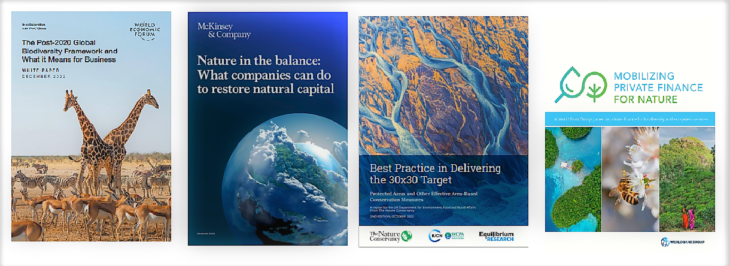Blog: Scotland – A Destination of Nature Prosperity
,
In December 2022, the 15th meeting of the Conference of Parties to the UN Convention on Biological Diversity (COP15) finalised the Kunming-Montreal Global Biodiversity Framework. The framework requires governments to show their progress towards the targets through their national biodiversity plans. Target 15 has been a particular focus of attention, as it calls for policy encouraging large companies to communicate their impacts on biodiversity.
The Scottish Government’s approach through the Scottish Biodiversity Strategy to 2045, details priority actions to halt biodiversity loss and become nature-positive by 2030. The Scottish Forum on Natural Capital encouraged the First Minister in our open letter to “bring together experts and businesses to help inform the ‘legally binding nature targets’ that the Natural Environment Bill will bring forward”. Funding is helping to catalyse private investment into nature in Scotland through the Investment Ready Nature Scotland (IRNS) grant scheme and support through a new Facility for Investment Ready Nature in Scotland (FIRNS), which will fund projects to cover the costs of developing new business and governance models and engaging with buyers and investors.
The Make it Mandatory campaign spearheaded by Business For Nature, supported by over 400 businesses, sends a strong signal to governments and regulators to legislate for nature, and many governments will mandate. The Government of Germany has granted €29m to develop the Taskforce on Nature-related Financial Disclosures (TNFD) framework and central banks are beginning to assess material financial risk.
Insights from our Business Rebalance for Nature workshop held in October 2022, suggest nature can be an investable part of the carbon codes and that as adoption of the TNFD framework spreads, we’ll see a shift in companies asset allocation creating huge potential for Scotland’s natural assets and a strategic advantage for Scotland as a destination for natural capital investment.
There are a number of reports and initiatives offering implementation advice for those organisations seeking to embed nature-related assessments and disclosures into practice. The World Economic Foundation (WEF) White Paper: The Post-2020 Global Biodiversity Framework and What it Means for Business details case studies of changes to business strategies across multiple sectors and emerging approaches. The McKinsey report: Nature in the Balance: What Companies Can Do To Restore Natural Capital suggests there are opportunities for farm businesses to deliver for biodiversity and diversify income, and offers advice on setting and monitoring progress against goals in order to prepare to disclose. There are significant opportunities for retailers and manufacturers to divert the 40 percent of food that is lost or wasted every year by matching supply with demand and turning food loss into new products. Enabling actions such as investing in green financial skills and data infrastructure, or incentivising nature-positive financial products are key.
Additional guidance is available in The Nature Conservancy’s Best Practice in Delivering the 30×30 Target report – Protected Areas and Other Effective Area-Based Conservation Measures, and the Nature Action 100 initiative from the World Bank proposed in the Mobilizing Private Finance for Nature report, provides a platform through which investors can articulate a clear vision for corporate action on biodiversity.

For small and medium enterprises looking to understand their environmental impacts and how to use a natural capital approach to understand risks and identify opportunities, the next step might be to explore how to apply the metrics outlined in the TNFD framework. By providing data from across the supply chain, nature impacts can more easily be incorporated into strategic planning, risk management and asset allocation decisions.
If you’re in need of some inspiration for change, Andrew W. Mitchell’s insights in ‘Convincing Titans on climate and nature’ for the Green Finance Institute (GFI) published ahead of COP15, provide a spark. He believes “Nature is now having its moment of truth” and that our love of nature will move us towards transformation. The McKinsey Nature in the Balance report also shares this vision to drive nature-positivity stating that “Building natural capital will be a journey that leads to a destination of greater prosperity”. Let’s take the next steps for Scotland.
|
Get involved Online launch of the FIRNS Facility on 28th February 11am Online launch of the UK Nature Impact Investment Strategy on 2nd March 11am Training session for organisations thinking about assessing and disclosing their nature-related impacts, using the TNFD Framework 14th March 9.30am
If you’d like to find out more about our work, you might want to explore our 100 Business Actions for Nature and other resources here.
|
